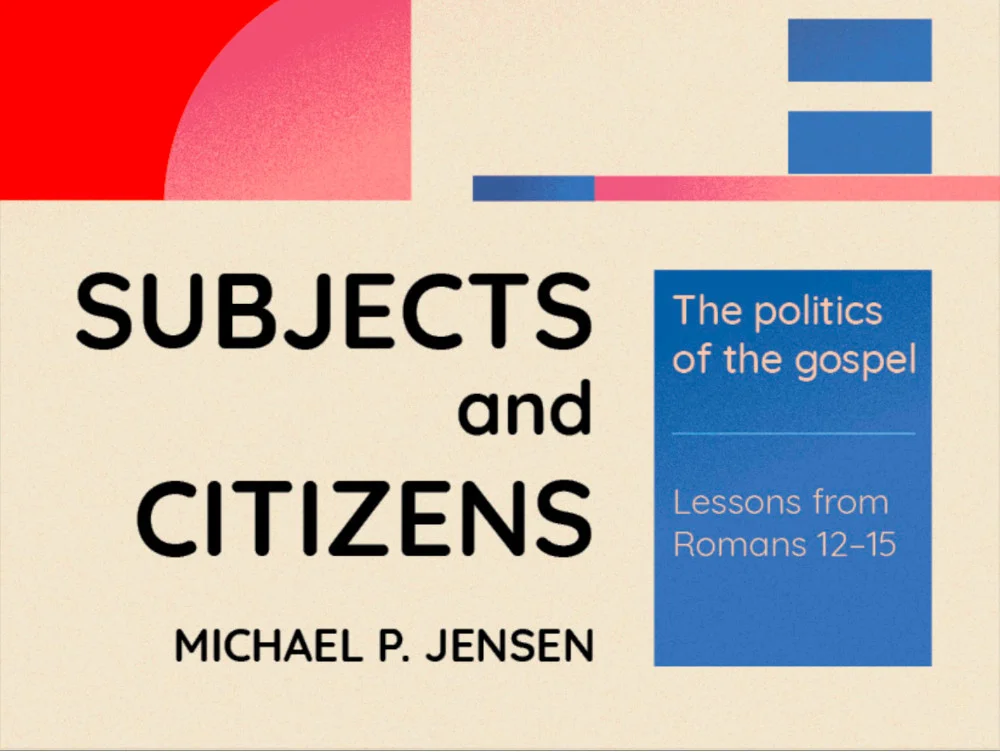by John McClean

If the Bible is a political book, and the church operates in a political landscape, then Christians should have more grasp of politics, not less, writes John McClean.
If you are a Christian who votes in elections, pay taxes or has conversations about politics, Subjects and Citizens: the politics of the gospel will give you a clear biblical framework for that.
And if you are a Christian who doesn’t vote, pay taxes or speak about politics, the book will help you see why you should.
If you are a minister, pastor or church leader, you should read this book, and more importantly you should encourage people in your church to read it. Buy some copies to hand around, suggest it for Bible study groups, use it for preaching ideas. If you are a Christian involved in political life you will find this an encouraging read, which puts politics in a gospel perspective.
In a highly polarised and contested political landscape, Christians are becoming more concerned and confused. When I started teaching at theological college, discussions about “political theology” did not generate much energy in class. Questions of how the church and Christians should relate to the government, or whether Christians should be involved in politics, seemed straight-forward and a little theoretical. In the last decade it has become the topic everyone wants to talk about in class. Students want to think it through themselves, and they know it is a tricky topic in lots of churches.
There have been a bunch of recent publications about politics and Christians. Subjects and Citizens is one of the best for Christians who want to get a biblical frame for the what, why and how of politics.
The Bible is a political book. Kings, governors and emperors appear in almost every book of Scripture; there are important instructions to the rulers of Israel and about how Christians should relate to non-Christian rulers, most notably Romans 13:1-7. Michael Jensen’s book is an exposition of Romans 12-15, so the direct teaching about rulers sits in the middle of the book. He shows us that the rest of the chapters, which say more about how Christians relate to each other, are also key for a “Christian politics”.
Buy some copies to hand around; suggest it for Bible study groups; use it for preaching ideas.
As a biblical exposition, Subjects and Citizens is grounded in the text and world of Romans. Jensen refers to the politics of the Roman Empire as Politics 1.0, which stands for all “secular” politics. He argues that Christians are called to Politics 2.0 in which Jesus is the crucified Lord who rules by humble service and Christians are called to new, primary loyalty to Christ so worshipping him is a political statement. That means that politics of this world, whether Caesar or Parliament or President, is not the final reality. Politics 2.0 has a radically different pattern. Jesus said the rulers of the Gentiles “lord it over” them; his followers are called to serve one another (Luke 22:25-26). So the church stands as a non-conformist community displaying a different politics of loyalty to Christ and love of each other.
Jensen says this is a version of Protestant “two kingdoms” theology, which distinguishes between God’s work in the world through his church, as it preaches his word and lives in love, and God’s work through the secular rulers (pp24-25). He notes that even those who recognise this general division often have major differences about how the two should relate. He warns Christians not to assume that their main political calling is to fight to restore Christian values and identity in the political scene, nor to assume that most major political issues are systemic rather than personal, nor to opt out of Politics 1.0 entirely. That’s already plenty for most readers to chew over.
But the book is not mainly about church and state or ideology or policy. Primarily it presents Politics 2.0 as a church focused virtue ethic. That is to say, “just being the church of Jesus Christ is a political act” (p27), and the book sets out what God calls his church to be, along with the political implications.
Each chapter, apart from first and last, are an exposition of section of Romans 12-15. The book started as sermon series and retains the positive features of that — it keeps close to the text and is pastoral and accessible. It also reads well, unlike some published sermons.
Our first political calling
Romans 12-15 is primarily about what should characterise church life and how we live together as God’s people. Jensen is right; our great political contribution is to be the church. Chapters 2 and 3 outline this as the politics of sacrificial nonconformity and politics of peace. Believers are transformed to be like Christ and not conformed to the world. Discipleship is our first political calling. We are to live at peace with each other demonstrating politics 2.0 in our churches as we pray together for peace in the world.
Chapter 4, on the “Politics of respect” considers Romans 13:1-7 and addresses how Politics 2.0 should shape a Christian approach to Politics 1.0. Christians acknowledge that Christ is Lord; political authorities rarely do. They didn’t at the time of Paul’s letter to the Romans; most, if not all governments of today reject the premise. This means there is a tension between serving God and respecting our rulers, a tension which can be more or less difficult.
Political authorities are appointed by God indirectly and by strange providence: to punish wrong and administer justice. Jensen is positive about the civil authorities taking wider roles but is not prescriptive about it. He also warns about the real danger of treating the government as saviour. Christians should be political realists, not idealists; yet, because rulers are appointed by God, Christians are to submit, obey and honour them.
Some see Christian politics as nothing more than maintaining a contrasting political community. That is not Jensen’s view. He argues that political life is a legitimate and important Christian vocation. Christians should be part of the political process, and even exercise power. We should be critical of politics 1.0, but not cynical to the point of detachment.
Jensen examines the possibility of Christian civil disobedience and recognises that there are situations in which Christians can be pushed to that (Acts 5:29). He recognises the risk of that path, but the danger of being complicit in an evil regime. While there are such extreme situations, most of us most of the time are called to honour the rulers, pay taxes and meet our obligations as citizens and disciples.
That is about the sum of the discussion about how Christians and the church relate to the state. Jensen says very little about political ideologies and only touches on a few issues of policy. This may frustrate some readers who would like a clearer line of criticism of liberal state or stronger calls for social justice. It may be that they are exactly the folk who would benefit most from reading Subjects and Citizens. Those who want to think about specifics of political life and policy will need more than this book, but this will be an excellent introduction.
The second part of the book, chapters 5-7 has more to say about how Christians engage with some aspects of Politics 1.0. Chapter 5, on the politics of love, reminds us of the gospel call to love each other, our neighbours, and even our enemies. Jensen argues that this Christian commitment lies behind a modern political commitment to equality in society.
Ch 6 presents the politics of selflessness. Jensen argues that Christ calls us to use our freedoms and privileges for the sake of others. Among other things this means that we should not simply rely on the government to care for the needy. Church caring is a key part of politics 2.0.
Ch 7 on the politics of hospitality is most focused on areas of public policy. Jensen argues that Christians should be concerned with migration, refugees and dispossessed first nations. He admits those are difficult policy questions and does not claim to have a solution. He thinks that at least Christians should warn governments away from cruelty.
Subjects and Citizens is a timely book which will be quite accessible for most believers who are thinking about or involved in politics. I hope that it will be widely read, and that lots of us will be led by the Spirit to not only serve well in Politics 1.0, but more so to live well together, as God’s display of His kingdom.
(Michael Jensen, Subjects and Citizens: the politics of the gospel, Matthias Media, 2024. https://matthiasmedia.com.au/products/subjects-and-citizens)
